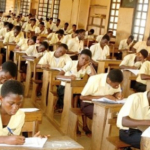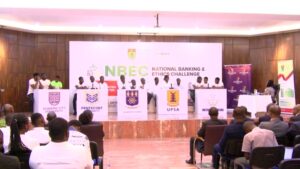
In recent years, Ghana’s educational landscape has been marred by a disturbing trend: the proliferation of online exam scams targeting candidates of the Basic Education Certificate Examination (BECE) and the West African Senior School Certificate Examination (WASSCE).
Fraudsters exploit platforms like WhatsApp and Telegram, luring unsuspecting students with promises of leaked examination materials, commonly referred to as “apor.” This malpractice not only jeopardises the credibility of our examinations but also undermines the very foundation of our educational system.
The digital deception
Investigations have revealed that these scams are often orchestrated through social media platforms, where fraudulent groups claim to possess authentic examination papers.
For instance, a report by Africa Education Watch (Eduwatch) highlighted how WASSCE questions were leaked and sold for GHC30 to GHC150 on Telegram channels with over 200,000 subscribers. Such operations are sophisticated, with payments made via mobile money and questions delivered hours before the actual exams.
The consequences
The implications of these malpractices are profound. The West African Examinations Council (WAEC) has been compelled to cancel thousands of results due to examination malpractices.
In 2024 alone, WAEC cancelled 4,108 subject results for unauthorised materials and 483 results for mobile phone possession during exams. Moreover, the entire results from 319 schools were withheld due to suspected collusion, pending further investigations.
Institutional responses
WAEC has intensified efforts to combat this menace. Ahead of the 2025 WASSCE, the council declared a war on high-tech exam malpractice, acknowledging the challenges posed by sophisticated cheating schemes. Collaborations with national security agencies, including the National Intelligence Bureau (NIB), have led to the arrest of invigilators involved in malpractices during the 2024 BECE.
The role of educators and stakeholders
Educators and stakeholders play a pivotal role in upholding academic integrity. The Ghana Education Service (GES) has taken a firm stance, announcing that teachers caught aiding in exam malpractices will face termination.
Such measures underscore the collective responsibility of all stakeholders in preserving the sanctity of our examinations.
A call to action
At GB Assessment Ltd., we believe safeguarding academic integrity is a shared responsibility. We urge students to resist the temptation of shortcuts and focus on diligent preparation. Parents and guardians should educate their wards about the dangers of engaging with fraudulent platforms. Institutions must reinforce ethical standards and ensure strict adherence to examination protocols.
Together, we can combat this threat and uphold the values that define our educational system. Let us commit to integrity, transparency, and excellence in all our academic endeavours.
As part of its corporate social responsibility, the firm has launched a campaign on examination malpractices, dubbed Examination Integrity.
This campaign seeks to educate students, especially BECE and WASSCE candidates, to abstain from examination malpractices and any form of fraudulent act that can jeopardise their education and, in turn, their future.
GB Assessment Ltd. is an Educational Testing and Assessment Firm based in Accra, dedicated to providing standardised summative assessments for basic schools and test preps (mock) for B.E.C.E candidates in the country, with primary aim of enhancing the academic performance of students and also help schools deliver the best form of education to their stakeholders.






